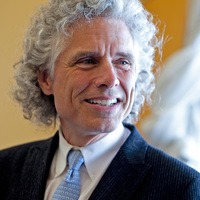The Language Instinct Summary
4 min read ⌚
 MicroSummary: Aimed at the general public, Steven Pinker’s “The Language Instinct” builds upon Noam Chomsky’s and Derek Bickerton’s theories and presents a cogent argument for a genetically preprogrammed short-termed capacity of the human brain to acquire and use language.
MicroSummary: Aimed at the general public, Steven Pinker’s “The Language Instinct” builds upon Noam Chomsky’s and Derek Bickerton’s theories and presents a cogent argument for a genetically preprogrammed short-termed capacity of the human brain to acquire and use language.
How the Mind Creates Language
Ever wondered how you are able to comprehend this sentence so effortlessly? If not – here’s your chance to. If so – you’ve probably never gone further than Steven Pinker.
And “The Language Instinct” is his magnum opus. Consequently, it’s also one of the ultimate classics in the field.
About Steven Pinker
 Steven Pinker is a Canadian cognitive psychologist and linguist. A psychology professor at Harvard, he is revered among the general population for his ability to convey complex ideas in simple language. He has written such classics as “The Stuff of Thought,” “The Blank Slate,” “Words and Rules,” and “How the Mind Works.”
Steven Pinker is a Canadian cognitive psychologist and linguist. A psychology professor at Harvard, he is revered among the general population for his ability to convey complex ideas in simple language. He has written such classics as “The Stuff of Thought,” “The Blank Slate,” “Words and Rules,” and “How the Mind Works.”
“The Language Instinct Summary”
We’ve already featured some of the books which have attempted – and sometimes successfully managed – to answer life’s and universes’ most difficult questions. However, none of them tried – let alone succeeded – to explain how human language came to be.
Even though the development of language is rightfully considered “one of the most significant points in human history.”
Well, in “The Language Instinct,” Steven Pinker tries to fill this void. Not only by summarizing other people’s achievements – Noam Chomsky and Derek Bickerton in particular – for the general public, but also by introducing few original and still controversial ideas.
And Pinker decides that the best way to start is by refuting some of the more prevailing theories. Such as, say, the Sapir–Whorf hypothesis, which you probably know from the movie “Arrival.”
This hypothesis states that language has an effect on your worldview as well, and it has stemmed some self-help movements such as NLP.
However, Pinker shows that it’s scientifically unsound. First of all, it’s not even properly researched by the amateur scientists who postulated; and, secondly, it doesn’t take into account many things, such as creoles and pidgins, or even deaf and mute people.
In Pinker’s opinion, it’s almost the other way around. For humans, language is something evolution naturally produced, since language-usage is inherent to the human nature.
Or, to put it in even simpler terms, it’s an instinct.
This means that we should stop considering language a skill – as we do, for example, writing. There are many societies which didn’t develop writing systems, but none which lacks a language.
Even more, children sometimes spontaneously invent their own language, and deaf babies tend to syntactically use their bodies.
Why?
In Pinker’s opinion, because, for some time during our development, language is an instinct much in the same way breathing is. After this critical childhood period, it seems that the language mechanism hardwired in our brain subsides. Possibly to make some space for other types of human endeavor.
However, if this is true – namely, if humans are language-speakers by default – then, why are there so many different languages? After all, we breathe and have sex in a similar manner.
Well, because, obviously, there are many cultures and they have lasted for thousands and thousands of years. But, even so, all languages share a basic structure.
Noam Chomsky named it universal grammar.
And in Steven Pinker’s opinion, it’s there inside your brain. And communication depends solely on it.
So, the next time your English teacher tells you that it’s not a good thing to end your sentences with a proposition, you can calmly reply:
“That’s not something Steven Pinker would agree with.”
Key Lessons from “The Language Instinct”
1. Language Is a Human Instinct
2. The Language-Learning Machinery Is Short-Timed
3. Grammar Rules Are, Strictly Speaking, Irrelevant
Language Is a Human Instinct
Language is a mystery. For example, it’s so complex that when you try to learn another language, you need several years to acquire its grammar. Then, how is a child able to learn it in just a year or two?
According to Steven Pinker, because his brain features a language-learning mechanism. And because language learning comes to it instinctually. Just like, say, breathing.
The Language-Learning Machinery Is Short-Timed
However, even though this instinct is universal – it’s not eternal.
In other words, there’s only a short critical period during childhood when children are able to use the language-learning mechanism. Afterward, it subsides and makes room for other brain tools.
This is the reason why sufficiently old feral children are unable to acquire human language, no matter how hard we try to teach them. The language-learning mechanism is not there.
Grammar Rules Are, Strictly Speaking, Irrelevant
This language-acquisition device inside your brain comes prepacked with universal grammar. Think of it as an empty puzzle, a framework – only for words. That’s why some sentences – such as “What did John meet a man who sold?” – are incomprehensible to you: the words just can’t seem to fit the puzzle in any way.
However, some others are pretty intelligible, even though some people tell you they are grammatically incorrect. Steven Pinker says: when a rule must be explicitly stated to be learned, then it can be ignored.
Because it’s irrelevant to actual communication. Which is what language is all about.
Like this summary? We’d Like to invite you to download our free 12 min app, for more amazing summaries and audiobooks.
“The Language Instinct” Quotes
Chomsky's writings are 'classics' in Mark Twain's sense: something that everybody wants to have read and nobody wants to read. Share on X Humans are so innately hardwired for language that they can no more suppress their ability to learn and use language than they can suppress the instinct to pull a hand back from a hot surface. Share on X The very concept of imitation is suspect, to begin with. (If children are general imitators, why don’t they imitate their parents’ habit of sitting quietly in airplanes?) Share on X The audible signals people can produce are not a series of crisp beeps like on a touch-tone phone. Speech is a river of breath, bent into hisses and hums by the soft flesh of the mouth and throat. Share on X Sometimes it is not easy to find any words that properly convey a thought. When we hear or read, we usually remember the gist, not the exact words, so there has to be such a thing as a gist that is not the same as a bunch of words. Share on X
Emir is the Head of Marketing at 12min. In his spare time, he loves to meditate and play soccer.






